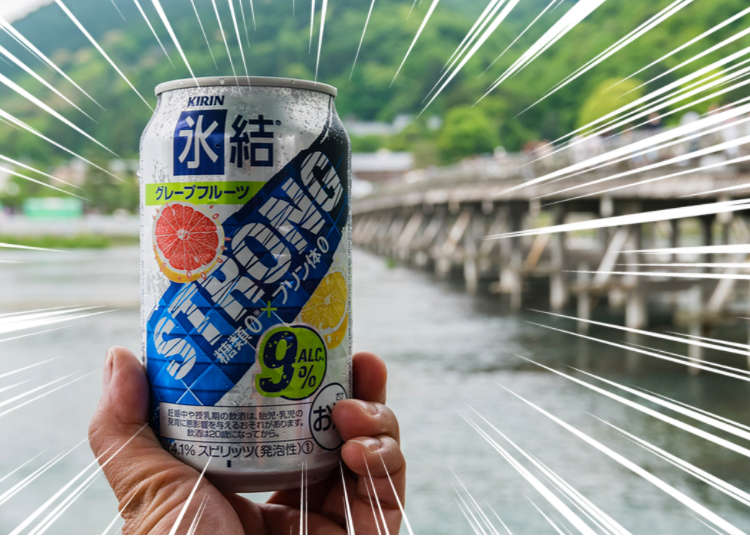
Quickly grabbed after work and casually enjoyed with some coworkers or friends: the chūhai is a canned alcoholic drink that traditionally is a shōchū (distilled alcohol) highball. It has become a go-to choice for pretty much anyone in Japan, rapidly increasing the selection at supermarkets and convenience stores all across the country. Its comparatively low alcohol content, comes in a wide variety of flavors, and its cheaper-than-beer prices make it a must-try when exploring the world of Japanese drinks! From low in sugar to wonderfully fruity and sweet, there’s a chūhai for every taste and palate on the market, with companies developing new flavors regularly and steadily. We headed to Keio Store to show you our recommendations for the top 10 Japanese chūhai drinks!
1. Popular with both Office Workers and Casual Drinkers: Shōchū Highball Lemon
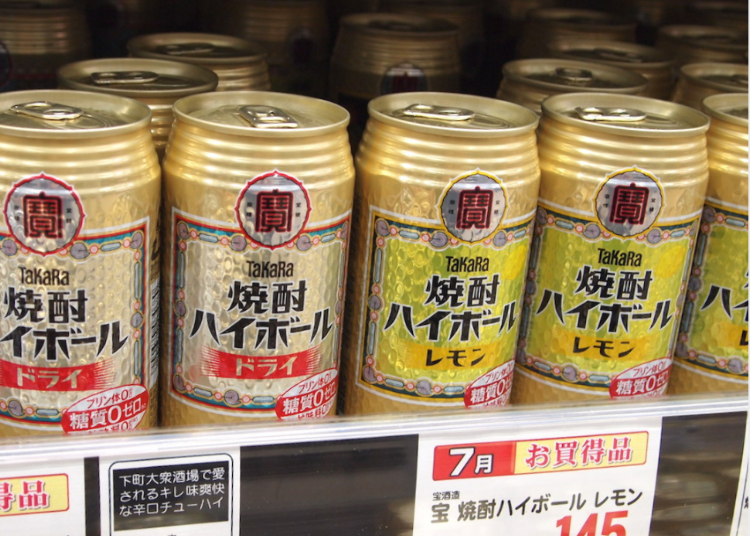
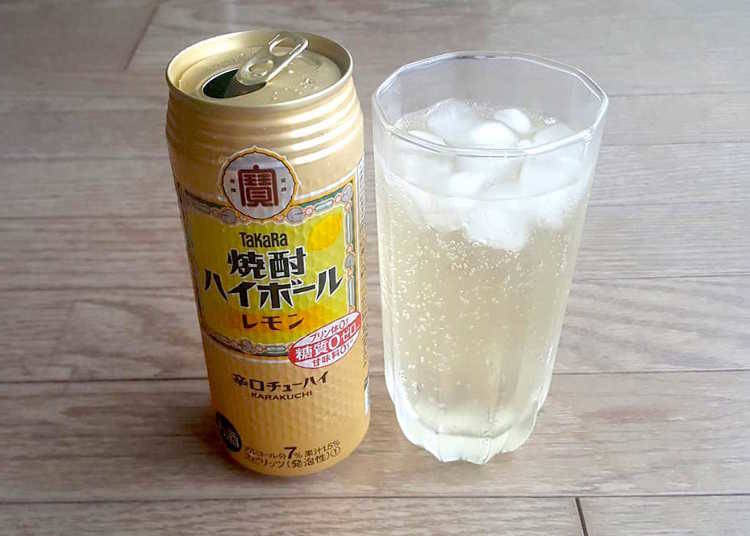
The retro design is a fan favorite since more than 10 years: Shōchū Highball.
Highball is usually made by mixing either shōchū or whisky with carbonated water. In Japan, it had an image of “old man’s drink” for quite a while, but because of its low price, few calories, and flavors such as lemon and plum, Highball is getting more and more popular with a younger crowd. Especially office workers and women in their 20 and 30s enjoy the drink, becoming the top-seller of the first half of 2018. Highball started out as a favorite choice in local downtown taverns around 1940, and the Shōchū Highball seeks to recreate the authentic dryness and flavor of the original. The citrusy lemon flavor is particularly refreshing on warmer days and there’s a total of 10 flavors to be enjoyed, including grapefruit, umeboshi (pickled plum), and so on. First sold in March 2006, the drink celebrates its 13th anniversary this year. With 7% alcohol and strong carbonation, it’s a great choice for people watching their weight because there are no sweeteners, sugars, or purines to be found.
2. Strong and Fizzy: -196°C Strong Zero Double Lemon
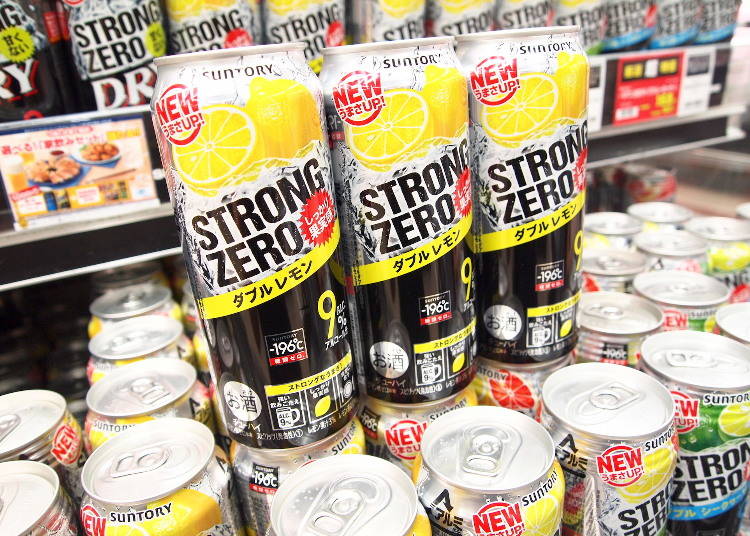
A representative of strong drinks, one can alone might knock you off your socks.
Suntory’s Strong Zero is a famous representative of stronger chūhai and was first released in 2009. Suntory is a major Japanese company famous for its whisky creations, but it is also prominent in the low alcohol content drink market where sales in 2018 have steadily been over 100%, compared to the previous year. The -196°C drinks make use of fruit peels being instantly frozen in liquid nitrogen, which is then finely crushed and soaked in vodka.
Alcohol in which whole lemons have been soaked and extra lemon juice make for a rich and deep flavor, while the other reason for this chūhai’s popularity is its high alcohol content of 9% - regular chūhai only have about 5%. It’s not too sweet and goes well with food, and especially office workers who have an eye on their health enjoy this drink because it is free of saccharides and purines.
3. Flavorful and Fruity: Chūhai Hyōketsu Lemon
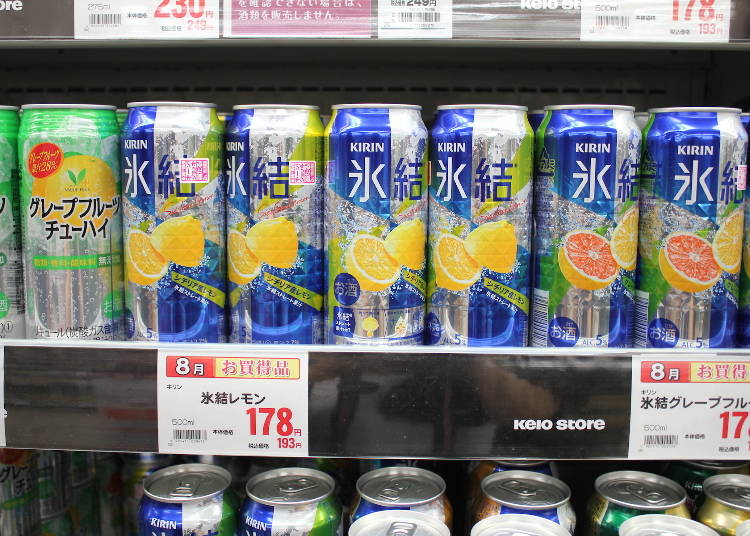
The diamond-cut can alone looks refreshing. What a fancy design.
Kirin’s Hyōketsu (Frozen) series was first released in 2001, making it a popular classic that is known as a synonym for can drinks. Its name comes from the process of squeezing the fruit without using concentrate and then “freezing” it. This straight, frozen fruit juice makes for a full-bodied and fresh taste and aroma, all thanks for this original method. Clear vodka adorns the can with the diamond pattern, a shape that is based on NASA research – it’s an eye-catching design. Four varieties belong to the Hyōketsu series: standard, strong, “tabi suru hyōketsu” (frozen travels), and zero. As of August 2018, there are 37 unique varieties in total, including Sicilian lemon and pineapple. There’s plenty of choice for thirsty chūhai fans! Among them, the lemon flavor is the most popular due to its low sugar content, vitamin C, and citric acid said to chase away fatigue.
4. Unrefined and Extra Fruity: Honshibori Grapefruit
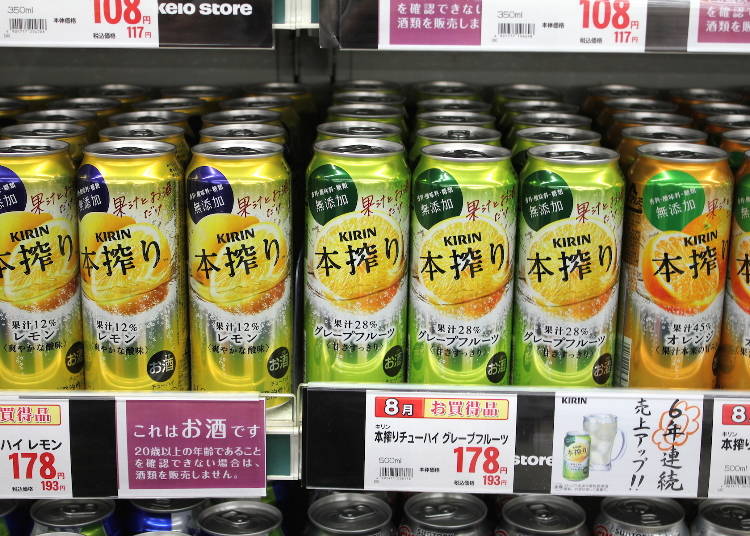
No flavoring, no acidifier, no sugar – it tastes like freshly squeezed at a pub.
The Honshibori series by Kirin was released in 2008 under the concept of “drinking at home,” seeking to reproduce the flavor of a freshly squeezed chūhai available at Japanese pubs. It’s free of flavoring, acidifier, and sugar, simply delivering the taste of fruit and alcohol. Mercian is the company that originally sold the Honshibori chūhai high in fruit juice, but the drink was re-released when Mercian became a part of the large company Kirin. This drink is known as nigori (“unrefined”), which is also printed at the bottom of the can. If you pour it into a glass, you can see its natural cloudiness, further testimony of the fruit juice being properly squeezed into the drink. That’s why you should turn the can on its head once before opening it. Next to grapefruit, there are various other flavors in the lineup, such as lemon, orange, and pink grapefruit.
5. Popular in Summer: Shōchū Highball Shequasar
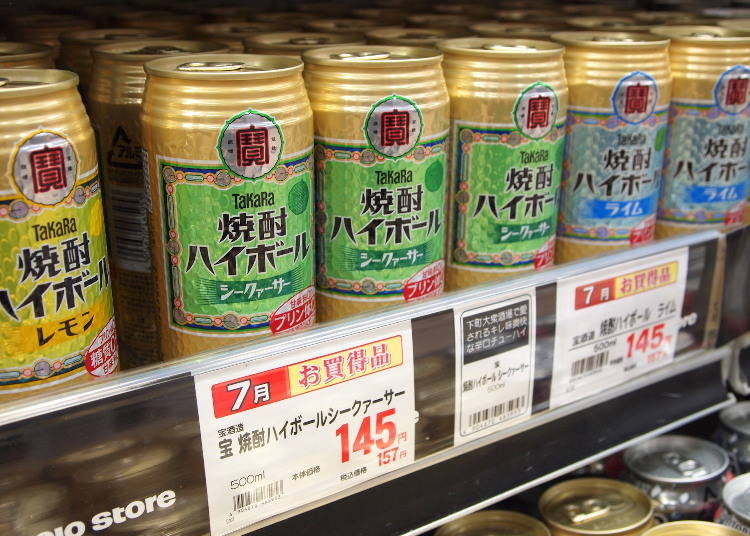
Becoming super popular: the shequasar flavor!
While lemon is the most popular taste for Shōchū Highball, shequasar (or Taiwan tangerine) takes second place. Takara’s Shōchū Highball is a strong performer on the market with a 20% rise between April and June of 2018, compared to the previous quarter. Especially the 500ml cans are doing well and keep growing. Especially the three flavors of “lemon,” “dry,” and “shequasar” are majorly popular and young people in their 20s or 30s seem to enjoy them as an authentic taste of Tokyo’s old downtown areas. Gone is the image of an old man’s drink! Takara’s Shōchū Highball has also gotten several regional can designs around Hokkaido, Tokyo, Nagoya, Osaka, and Okinawa. The shequasar flavor is only sold in 350ml cans available in Tokyo, Nagoya, and Okinawa.
6. The Taste of Two Kinds of Grapefruit: -196°C Strong Zero Double Grapefruit
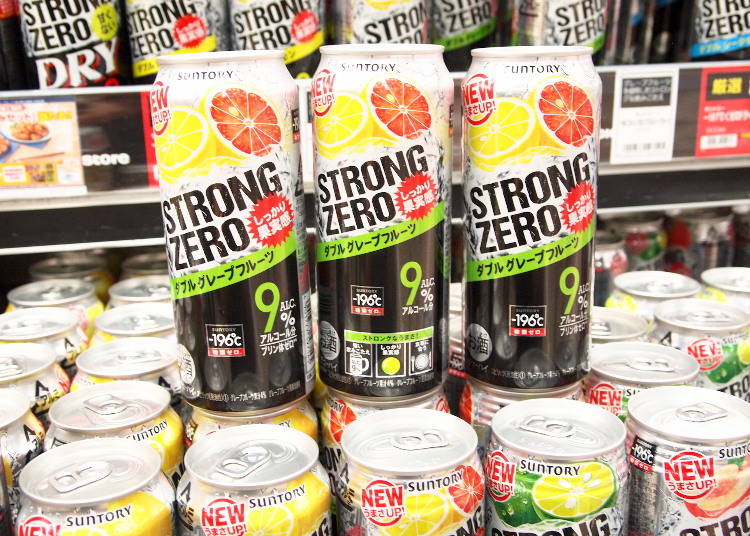
A refreshing summer taste.
Double Grapefruit is the second most popular of Suntory’s Strong Zero series, following Double Lemon. It is made with the two grapefruit varieties “white” and “ruby,” boasting a rich fruit aroma as soon as you open the can. A large internet company recently announced that “strong zero” is a high-ranking keyword in the first half of 2018, and it’s interesting to see that it is so popular in the low alcohol content beverage market despite being rather strong.
On top of that, a lot of international tourists in Japan are surprised to see a drink with 9% alcohol content available for about 200 yen at supermarkets and convenience stores.
7. Light, Pretty, and Easy to Drink: Horoyoi White Grape
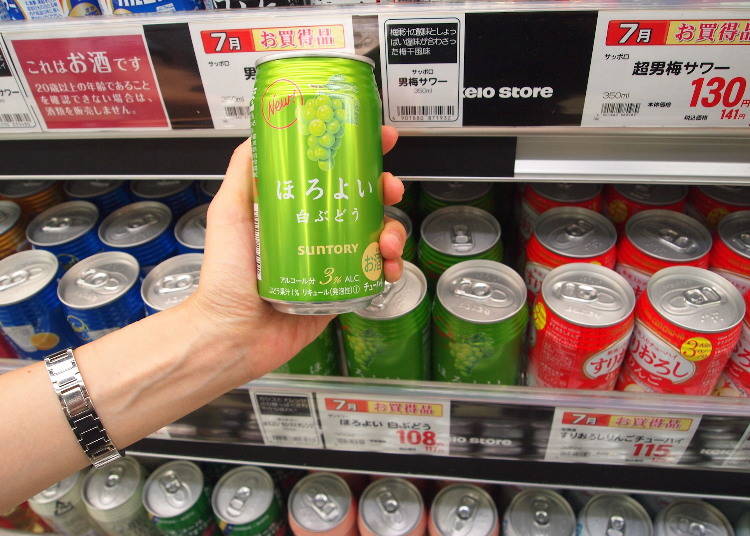
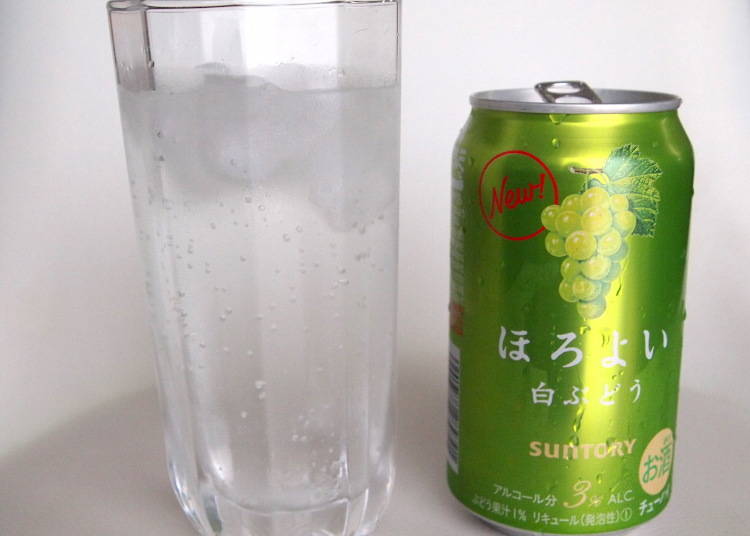
The colorless drink has a finish like white wine.
Suntory’s Horoyoi series was released in 2009 and is known for its low alcohol content, making it popular with people who prefer a lighter choice. Its fancy design is also a reason for the popularity and while plenty of companies go for fruity chūhai, Horoyoi stands out with its diverse lineup of cocktail-like flavors, including creations such as white sour, cassis and orange, or ice tea sour. The White Grape version is reminiscent of white wine and very easy to drink. Especially popular among women, the drink has the gentle sweetness of fruit. Next to the 15 classic flavors, there are always 8 limited cans on sale as well, available only for a certain amount of time.
8. A Wonderfully Dry Long-Seller: Takara Can Chu-Hi Premium
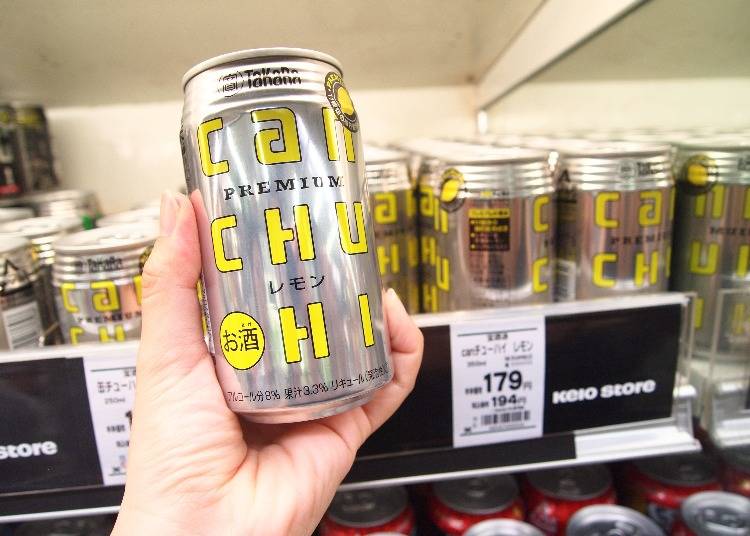
The popular long-seller and its simple but chic design.
This is Japan’s very first canned chūhai, born in 1984, and its series “Takara Can Chu-Hi” is dearly loved to this very day. It’s made with 11 types of barrel-aged Japanese sake, hand-picked lemons from Sicily, and charcoal-filtered water – all ingredients are carefully selected to create a wonderfully luxurious taste. The 9% alcohol drink comes in the flavors of lemon, dry, grapefruit, lime, and plain. This pioneer of canned chūhai is characterized by its high alcohol content and no-nonsense flavor, single-handedly establishing a new genre of drink with its colorless mix of shōchū, fruit juice, and carbonation. All flavors are also available as 250ml cans, so it’s a perfect choice if you’re after quick sip.
9. An Aftertaste of Refreshing Plum Liquor: Sarari Toshita Umeshu Sparkling
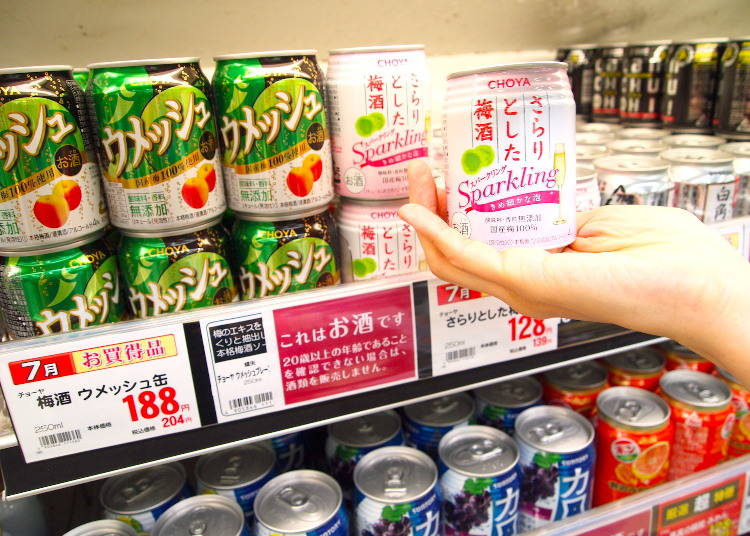
The fresh, gentle aftertaste makes this drink ever popular.
Choya means plum liquor – the company is a long-established pioneer that many people regard as the first choice for umeshu (plum wine). Sarari Toshita Umeshu was first sold in 1996 before a semi-carbonated version came out in 2002. That lead to a renewal and today’s Sarari Toshita Umeshu Sparkling, available since 2014 and the lineup is growing steadily. With an alcohol content of 4%, it’s particularly popular among women. The drink is made without acidifiers or flavoring agents and gets its rich taste from domestic plums from Kishū, sugar, and liquor – those are the only ingredients. Plum liquor is an ancient drink of Japan and is recently gaining popularity abroad, boosting exports as a drink that goes well with Japanese food.
10. Very Low in Calories: Karori. Mediterranean Lemon
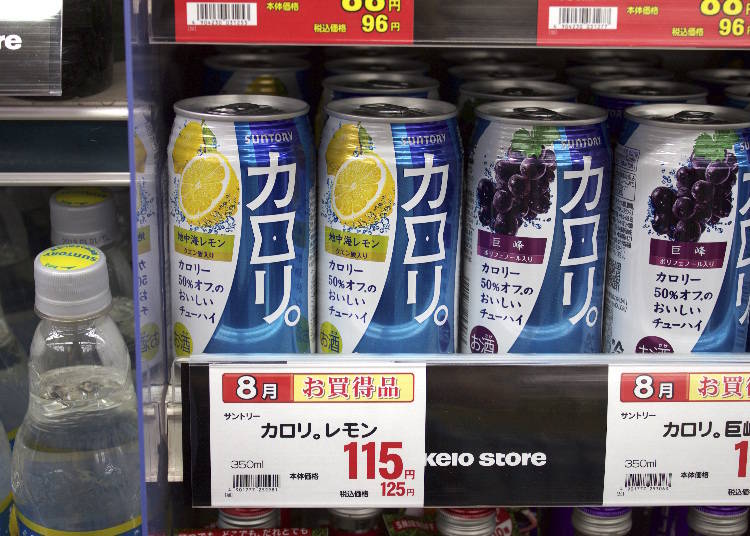
A long-seller that is very low in calories.
Suntory keeps dominating the low alcohol content beverage market and one of its most popular drinks is the Karori. series. As its name suggests, it has 50% fewer calories than what other Suntory fruit chūhai have on average while being just as tasty, if not more. Compared to a lemon chūhai of a different company, Karori. has about 100 calories less, which is quite a lot. Next to the Mediterranean Lemon flavor, there are five kinds in total: kyohō grape with polyphenol, grapefruit, white peach, and Muscat fruit.
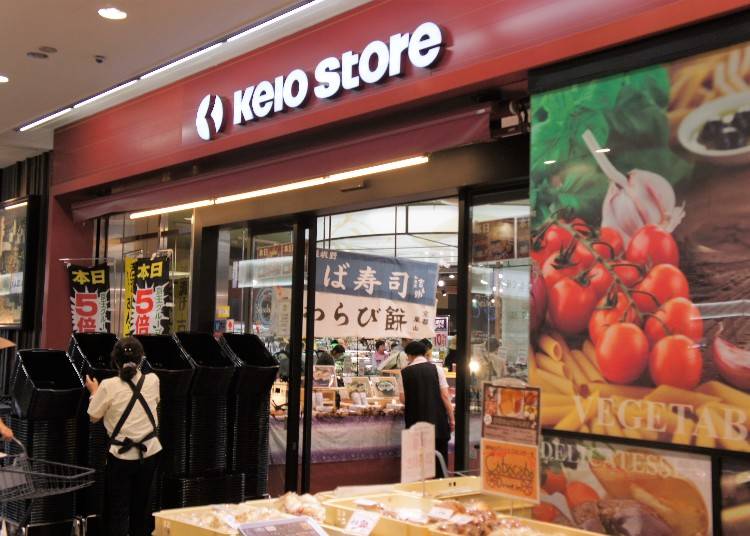
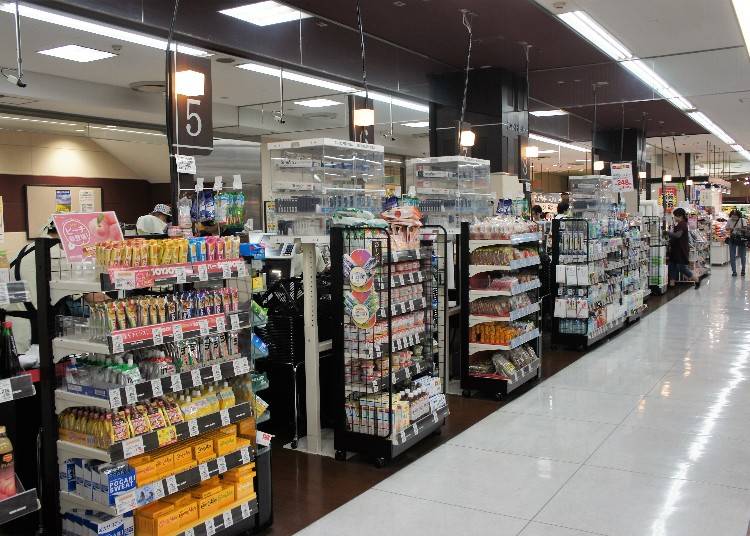
Keio Store is a supermarket chain that is all about the daily life around Keio Electric Railway’s lines. As of right now, there are 33 individual stores including the affiliates Kitchen Court and Keio Store Express, all of them loved by the locals. We hunted for the best heat-to-eat curry specialties at the Sakuragaoka Store, right next to Sakuragaoka Station, and also recommend its other diverse product selection, ranging from fresh foods to alcohol and miscellaneous goods. Women are the main customers during the day while office workers crowd the shop in the evening on their way home from work.
Main image credit: Phurinee Chinakathum / Shutterstock.com
-
Keio Store (Sakuragaoka)京王ストア 桜ケ丘店
- Address 〒206-0011 東京都多摩市関戸1-11-1 / 1-11-1 Sekido, Tama-shi, Tokyo, 206-0011, Japan
-
Nearest Station
Seiseki-sakuragaoka Station (Keio Line), right next to the station
- Phone Number 042-337-2511
Hours: 10:00 a.m. – 11:30 p.m. (2F is open until 9:00 p.m.)
Closed: January 1, irregularly twice a year
- Area
- Category
*Prices and options mentioned are subject to change.
*Unless stated otherwise, all prices include tax.
Popular Tours & Activitiess
Recommended places for you
-
Ad

What Makes Japanese Yakiniku So Darn Good? Guide to Cuts, Heat, and Wagyu Know-How
-

Where to Buy a Japanese Kitchen Knife? Why Travelers Choose MUSASHI JAPAN's 14 Stores in Tokyo, Kyoto, and Nara
by: Guest Contributor
-

To the Holy Land of Kawaii! Odakyu Tama Center Station Is Becoming a Dreamy Sanrio Wonderland
by: Guest Contributor
-

PokéPark KANTO Is Finally Open! Tokyo's New Pokémon World Starts Before You Even Arrive (2026)
by: Guest Contributor
-

A New Tokyo Landmark Is Coming in 2026, and It's Built for Modern Travelers
by: Guest Contributor
-

Farewell, Heavy Suitcases! Keisei Ueno’s New Service Makes Your Last Day in Tokyo Totally Hands-Free
by: Guest Contributor
-

What Do Japanese Buy at the Supermarket? Top 10 Quirky Japanese Drinks!
-

Top 10 Best-Selling Instant Noodles at Japanese Convenience Stores
-

Complete Guide to Buying Japanese Medicine in Japan: Phrases and Vocabulary You Need to Know
-

What Do Japanese Really Buy At The Supermarket? Take A Look At Japan’s Top 10 Sweet Snacks!
-

What Japanese Really Get At The Supermarket: Japan’s Top 10 Quirky Local Drinks!
-

JR Edition: Visit all of Tokyo in one Day with the Tokyo Metropolitan District Pass!
- #best ramen tokyo
- #what to buy in ameyoko
- #what to bring to japan
- #new years in tokyo
- #best izakaya shinjuku
- #things to do tokyo
- #japanese nail trends
- #what to do in odaiba
- #onsen tattoo friendly tokyo
- #daiso
- #best sushi ginza
- #japanese convenience store snacks
- #best yakiniku shibuya
- #japanese fashion culture
- #best japanese soft drinks


















